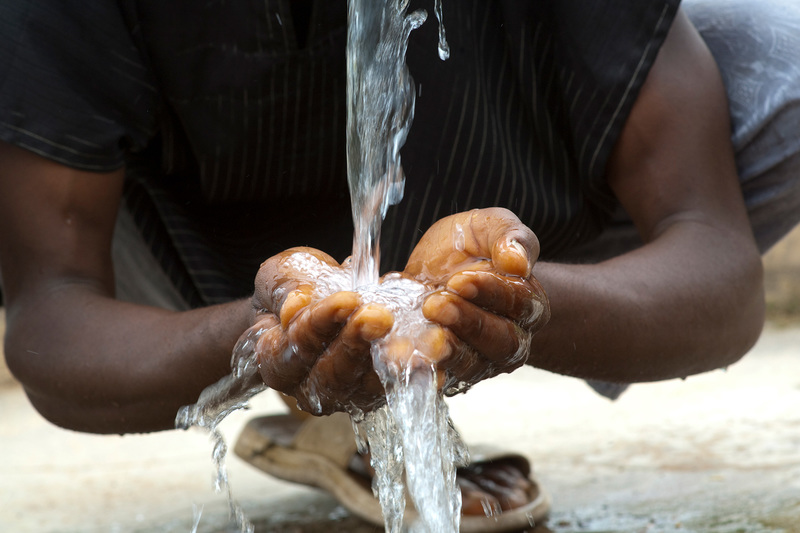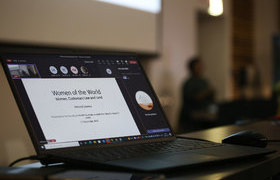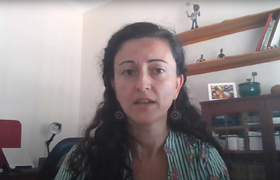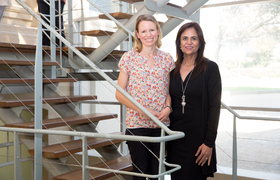Tackling Africa’s grand challenges together
22 December 2023 | Story Natalie Simon. Photo World Bank Photo Collection, via Flickr. Read time 9 min.
The University of Cape Town (UCT) awarded two full-scale research programmes and four pilot projects as part of the UCT Vision 2030 Grand Challenges Programme. Each of these projects, developed by an interdisciplinary team and chosen from a large pool of submissions, conveys big and bold ideas that have strong potential for impact, scale and sustainability in addressing the grand challenges of the continent.
UCT, in its Vision 2030, set itself the ambitious goal of “unleashing knowledge in, for and from Africa to redefine and co-create a sustainable global future”. This gives recognition and priority to the drive that the research and innovation needed to tackle the continent’s complex crises must originate from Africa.
To achieve this goal, UCT Deputy Vice-Chancellor: Research and Internationalisation Professor Sue Harrison, together with Executive Director: Research, Dr Linda Mtwisha, developed the 2030 Research Catalytic Programme. This seeks to support new ways of working, including foregrounding inter- and transdisciplinary research and engaged scholarship, to develop research projects with high impact.
The Grand Challenges Programme, which falls under this initiative, seeks to create networks across UCT, civil society, policymakers and industry to solve some of the challenges faced by society now and in the future. The projects have the additional goal of cultivating the next generation of researchers as a diverse cohort, both reflecting the demographics of our society and skilled in research across disciplines and targeted for impact.
“We now have many proposals ready for potential funders to help us further our drive to unleash knowledge in, for and from Africa.”
By encouraging the interface of deep disciplinary knowledge-generation with interdisciplinary research and translational focus across departments and faculties, Professor Harrison hopes to see new and innovative solutions to the problems that plague local communities, the country and continent.
“We now have many proposals ready for potential funders to help us further our drive to unleash knowledge in, for and from Africa,” said Harrison.
Two programme proposals and four pilot projects were awarded through UCT funding with a fifth already supported through philanthropy funding. All these projects have taken form over the course of 2023.
Centre for Developing Cancer Therapeutics for Africa (CDCTA): developing innovative immune therapeutics for cancers prevalent in African women (programme)
Professors Virna Leaner, Sharon Prince and Stefan Barth (Department of Integrative Biomedical Sciences and Department of Human Biology) are co-principal investigators working with colleagues from a range of disciplines to develop and implement targeted cancer therapies.
Their work focuses on the cancers most prevalent in Africa, including breast and cervical cancer, with the overarching goal to develop cost-effective, next-generation, innovative immunotherapeutic solutions.
“In South Africa, breast and cervical cancer are of the most common malignancies and the main cause of cancer deaths in women,” said Professor Leaner. “Cheaper and efficacious therapeutic drugs are thus urgently needed.”
The project also equips young African scientists with the scarce skills of translational medical sciences and biotechnology.
Reorienting research, innovation and practice to address future water challenges in Africa (RRIP) (programme)
This project sets out to improve water security in Africa through transdisciplinary approaches to shifting policy and practice for water resource management, particularly wastewater management and water reuse. Both the principal investigators of the project, Associate Professor David Ikumi (a civil engineer) and Dr Amber Abrams (an anthropologist), are members of the Future Water Institute.
“Our research team acknowledges that our key role is to act as knowledge bridges and relational connectors, linking policy and decision-makers with local residents, workers and citizens who, daily, face the realities that emerge from decisions and policies,” said Dr Abrams.
The researchers are working alongside civic organisations and stakeholders in the water and sanitation sector and in partnership with external experts on the development of translational research outputs to influence policy.
Co-creating sustainable pathways for low-income mothers’ quality of life (pilot)
Professor Ameeta Jaga, a work-family scholar in organisational psychology, School of Management Studies, is leading a participatory action research project using photovoice to improve gender equity and quality of life for low-income mothers.
Significantly, this pilot centres mothers as knowledge experts of their motherhood strengths, needs and struggles. As co-researchers the mothers identified their intersecting vulnerabilities and actions for transformative and innovative practical and policy responses.
“The study focuses on the missing linkages between intersecting challenges, acknowledging southern contextualities and positioning these women as bearers of knowledge,” said Professor Jaga.
Investing in our future: developing a multi-dimensional service package to support return to school of pregnant and mothering learners (pilot)
In South Africa, one in three girls has a child by the age of 19. Adolescent motherhood often harms the education, livelihoods and health of mothers and their children.
Led by Dr Jane Kelly, and mentored by Associate Professor Elona Toska, director of the Adolescent Accelerators for Research Hub in the UCT Centre for Social Science Research, this project works with the Department of Basic Education in their vision to improve school retention during pregnancy and return to school post-birth.
“This project seeks to co-develop an evidence-informed service package focused on supporting adolescent mothers in their secondary schooling by combining the latest evidence with our quantitative and qualitative and participatory research,” said Dr Kelly.
Biomimetic hydrogels for myocardial infarction therapy (pilot)
Coronary artery disease with the concomitant risk of chronic heart failure is on the rise in Africa.
This pilot, led by Professor Neil Davies in the Department of Surgery, investigates the use of injectable hydrogels to cheaply, and without invasive surgery, limit progression to chronic heart failure after heart attacks.
“The use of hydrogel injections for chronic heart failure is appealing in the African context as it will reduce the need for costly heart transplants through the use of simple, minimally invasive approaches,” said Professor Davies.
The development of an approach to community-based, disability-inclusive disaster risk reduction systems (DIDRR) (pilot)
Communities in low-resource settings in the Global South are the most vulnerable to climate change-related disasters. This is particularly true for people with disabilities, who are often left without much support or consideration – even in disaster response strategies.
This project led by Dr Willem Stassen, Division of Emergency Medicine, and Professor Judith McKenzie, Division of Disability Studies, is a collaboration with community participation.
“The project seeks to co-create disaster risk-reduction systems that are responsive to all communities, including people with disabilities, thereby reducing vulnerability to and bolstering resilience following climate-related disasters,” said Dr Stassen.
The Healthy Cities Research Programme (philanthropy-funded pilot)
According to the World Health Organization, around 50% of all productivity lost in Africa in 2015 was due to often treatable disease and injury. But over 90% of people living in Africa have no access to safe, affordable and timely surgical care.
The interdisciplinary programme seeks to place access to surgery high on the agenda of cities. The initiative plans to establish a research hub in South Africa. Working across academic disciplines, local government and other relevant stakeholders, the project aims to identify and address the enablers and barriers of access to surgical care in rural and urban communities in Africa.
“Through a people-centred approach, safe and timely surgical care can be delivered to those who access the health system,” said Professor Salome Maswime, principal investigator on the project and head of the Division of Global Surgery at UCT. “But to do this we need to leverage the skills and expertise across different disciplines, address interconnected health challenges in Africa and translate research findings into actionable policy.”
Stimulating inter- and transdisciplinarity at UCT
Building on deep disciplinary knowledge through working across disciplines and various societal sectors to address challenges is increasingly being viewed as the most effective way to achieve the ambitious United Nations Sustainable Development Goals and meet the African Union’s Agenda 2063.
To lay the groundwork to nurture this approach for the Grand Challenges Vision 2030 call and to stimulate interdisciplinarity across faculties and fields within UCT, the Research Office facilitated two networking events in 2022. The events connected UCT researchers across departments and faculties who otherwise have little chance to meet.
The first, held in June, was attended by some 250 UCT researchers spanning the spectrum of established and early-career researchers and saw the launch of the Vision 2030 Grand Challenges Programme as well as an enthusiastic sharing of ideas.
This was followed by a design-thinking session on the Grand Challenges in the Research Vision 2030. Facilitated by the Hasso Plattner d-school Africa, the session was attended by researchers who had submitted their expression of interest in this programme.
This cross-UCT connection has been maintained in 2023 through the inter-faculty conversion series, the SDG forum as well as regular research fora. Increasingly, our researchers are tackling the continent’s most pressing problems through interdisciplinary collaboration built on UCT’s cross-cutting strengths.
 This work is licensed under a Creative Commons Attribution-NoDerivatives 4.0 International License.
This work is licensed under a Creative Commons Attribution-NoDerivatives 4.0 International License.
Please view the republishing articles page for more information.










